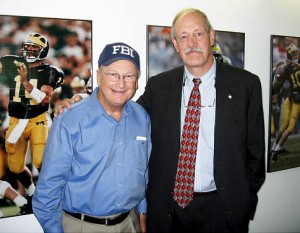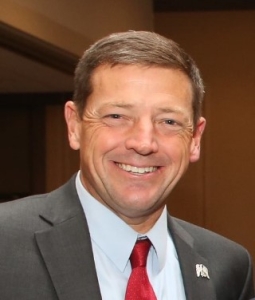As head of the FBI’s Ann Arbor office, Greg Stejskal got to know well the legendary University of Michigan football coach Bo Schembechler. Stejskal, who has retired from the FBI, gives his insights into the Penn State scandal and discusses how he thought Schembechler, who died in 2006, might have handled it.

“Do the Right Thing –Always,” Bo Schembechler
I want to preface this by saying, I was an admirer of Joe Paterno and Penn State football, which in my adult life have been synonymous. I don’t know Joe Paterno, but I know that he has been head coach at Penn State for 46 years and has been extremely successful, winning 409 games and two national championships.
Paterno achieved this seemingly without compromising sound values. His players were encouraged to be student-athletes with equal emphasis on the student part.
The football program’s slogan was “success with honor.” All of that including Paterno’s legacy is in jeopardy.
There was a seamy underside to all that success, Jerry Sandusky. Sandusky played for Paterno then became a coach. Ultimately, he was Penn State’s defensive coordinator (the face of Linebacker U). He was characterized as Paterno’s heir apparent. But if numerous allegations are to believed, Sandusky was, at least, as far back as the mid 90s, a child molester – using his position and its status to sexually abuse young boys.
Sandusky’s alleged transgressions go beyond despicable, but the issue for Paterno is what did he know, when did he know it and what did he do about it. According to the report of the Pennsylvania Grand Jury, that was investigating the allegations against Sandusky, in 1998 the Penn State police conducted an investigation regarding allegations that Sandusky was in involved in the molesting of young boys.
The case was presented to the local prosecuting attorney, but no charges were brought as a result of that investigation. (It is difficult to believe a case could be presented to the prosecutor without Paterno being aware of the investigation.)
Coincident with the conclusion of that investigation, Sandusky was informed by Paterno that he would not be Paterno’s successor as head coach. Following the 1999 football season, at the age of 55, Sandusky retired from the Penn State coaching staff.
I don’t know what caused Sandusky’s precipitous fall from grace, but the timing, at best, seems curious.
Although Sandusky was no longer on the Penn State coaching staff, he was still a member of the PSU faculty. He remained an Assistant Professor of Physical Education Emeritus with full access to Athletic Department facilities and other perks.

According to the Grand Jury report, March 1, 2002, Mike McQueary, a PSU football graduate assistant (now the wide-receiver coach) saw Sandusky sodomizing a young boy in the shower area of the football building. McQueary knew Sandusky andwas shocked and unsettled, but on the following day he reported what he had seen to Paterno. Paterno then told the Penn State Athletic Director, Tim Curley, of McQueary’s eyewitness account. Later McQueary would be interviewed by Curley and Penn State Senior Vice-President, Gary Schultz. It is not clear what further actions were taken as to Sandusky, but it is clear this incident was never reported to the police or child welfare authorities. Nor apparently was any action taken to identify the young boy or ascertain his welfare.
Sandusky retained his Assistant Professorship (He was listed in the faculty directory as recently as last week.) and his access to University facilities. According to the Grand Jury report, Sandusky’s abuse of young boys continued after 2002.
So did Paterno fulfill his responsibility as head football coach and as Sandusky’s former boss?
I don’t think it can be overstated the prestige and sheer clout that Paterno has at Penn State, but for whatever reason, he apparently never used any of that to further pursue the Sandusky matter or to inquire about the welfare of the alleged victims.
In comparison, I pose the hypothetical question: What would Bo Schembechler have done?
Bo is a man I did know. Bo was a legendary football coach at Michigan from 1969-1989 and a peer of Paterno.
To the best of my knowledge, Bo never had to deal with any of his staff being alleged child molesters.
He did have situations that required staff and players having to take responsibility for their acts even if it might reflect badly on Michigan, a place he loved and revered.
In 1987, the FBI was investigating two sports agents, Norby Walters and Lloyd Bloom, who had ties to organized crime. Walters and Bloom had worked up a scam where they bribed blue-chip college football players to sign post-dated, secret, agency contracts while they were still eligible to play college football – a clear violation of NCAA rules. Ultimately some of the players balked, threats were made by Walters and Bloom, and the whole thing fell apart.
Players who had signed the contracts were identified. They were all star players on prominent college teams. Two of the players were on Bo’s 1986 Michigan team.
When Bo found out, he was livid. He called one of the players, Garland Rivers, an All-American DB, into the office and had Rivers tell him the whole story.
Then Bo called me.
When I got to Bo’s office, Bo told Rivers “Tell this FBI agent everything about your relationship with Norby Walters.” Bo could have distanced himself and Michigan from the investigation.
Michigan would have been just one of many major football programs victimized by Walters and Bloom. But that wasn’t Bo. Damage control doesn’t mean hiding from the truth. It means taking responsibility for your actions and trying to rectify the mistakes.
Walters and Bloom had enticed his players to break the rules. They had besmirched Michigan. Bo knew he had to take a stand and do what he could to protect future players from illicit agents.
Later, when Walters and Bloom went on trial in Federal Court for racketeering and fraud, Bo testified. He was the star witness. His testimony was so strong, the defense declined to cross exam him. Walters and Bloom were convicted. What had been a dark moment in Michigan football history was a comeback win as important as any that had occurred on the field.
So what would Bo have done if faced with an assistant coach who was allegedly molesting young boys.
We’ll never know for sure, but I’m certain that he wouldn’t have just reported the allegations to his boss and done nothing else. Bo would have made sure the police were aware of the allegations. And that assistant coach would not have had access to Michigan athletic facilities or be emeritus anything.
It has been said that Paterno fulfilled his legal responsibility by reporting the allegations to the Penn State AD.
However, it would seem he did not fulfill his moral responsibility by making sure the allegations were pursued and, thus, protecting potential future victims.
We may never know why Paterno failed to pursue the Sandusky matter further. Perhaps Paterno didn’t do more out of a misguided effort to protect the reputation of Penn State, but if that was the motive, far more damage has been done to Penn State’s reputation than would have been done had this matter been fully confronted in 1998 or 2002.
Bo did not see degrees of honor and integrity. You either did the right thing or you didn’t – half way was unacceptable.






I enjoyed your article, particularly as I am a Michigan resident and a fan of Schembechler. Except I have a concern. Before giving you my concern, I would remind you that as a career F.B.I. agent what may seem obvious to you is not obvious to a civilian, whether it is me or Bo Schembechler or Joe Paterno.
In 2002, Gary Schultz, with whom Paterno and McQueary met, was known as the man who headed up the campus police. That is why he was at the meeting. He is not a police officer. But it seems to me, a civilian, a fair assumption that he has official police sanction.
With this in mind, the meeting between Paterno, McQueary, and Schultz is much like your meeting with Bo Schembechler and the football player.
What did Bo Schembechler do after your meeting? Did he go to your office, un-summoned, to ask what you were doing? I suspect he waited. You would call him if and when you needed him. Did Bo Schembechler try to have a meeting with Norby Walters and Lloyd Bloom on his own? Is he guilty of “inaction” for failing to try? I suspect he would have gotten into serious trouble for doing so. It is not his place.
What if you called Schembechler back, and informed him the case was closed? Is he then supposed to contact somebody else?
It seems to me entirely possible that some of the people, including Paterno, may very well have thought that there was a police investigation. Investigations of this nature are strictly confidential and non-police people are NOT supposed to interfere. It is also extremely rare to bring charges against someone without a victim’s statement even if you have a statement from a witness like McQueary. It may not be clear to non-police people regarding when you are supposed to give a signed, written statement — particularly if the police do not feel they can proceed.
Did Joe Paterno think a police investigation had been done? That’s a pretty good question. I don’t think it ever got asked.